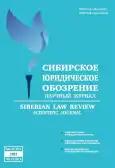Problems of Theory and Practice of Investigative Experiment
- Authors: Chelysheva O.V.1,2
-
Affiliations:
- North-Western Branch of the Russian State University of Justice
- Saint Petersburg University of the Ministry of the Interior of Russia
- Issue: Vol 19, No 2 (2022)
- Pages: 176-184
- Section: КРИМИНАЛИСТИКА, СУДЕБНО-ЭКСПЕРТНАЯ ДЕЯТЕЛЬНОСТЬ, ОПЕРАТИВНО-РОЗЫСКНАЯ ДЕЯТЕЛЬНОСТЬ (архивный раздел)
- Published: 09.09.2022
- URL: https://bakhtiniada.ru/2658-7602/article/view/349698
- DOI: https://doi.org/10.19073/2658-7602-2022-19-2-176-184
- EDN: https://elibrary.ru/GDBIIU
- ID: 349698
Cite item
Full Text
Abstract
The article is devoted to a comprehensive study of the investigative experiment as one of the types of procedural actions performed within the framework of criminal proceedings. In the introduction, the genesis of the theoretical foundations of the investigative experiment is considered, the relevance of the topic of the article in the modern setting is indicated. The Author identified problems associated with understanding the investigative method of research, which underlies the investigative experiment as an investigative action, noted the controversy of individual judgments expressed in forensic literature. The Author refutes an attempt to define the essence of the investigative experiment through the concept of “reproduction”. In this regard, the legislative approach to the definition of an investigative experiment has been criticized, which does not make it possible to distinguish an investigative experiment from other investigative actions related to the reproduction of actions, events, reconstruction of the situation, etc. Particularly important is the delimitation of the investigative experiment from the verification of testimony on the spot. The necessity of formulating the definition of the concept of an investigative experiment through the concept of “experience” is substantiated. In addition, the issues of classification of investigative experiments, which are based on the intended purpose of the investigative action, are considered. The theoretical and practical significance of the proposed classification is substantiated. The Author of the article describes the features of the tactics of conducting an investigative experiment, depending on its assignment to a particular group. In particular, the features of the use of “props” used in the process of experiments, determining the composition of the participants in the investigative action, the need to recreate the conditions of a real event are reflected. In addition, the issues of using the results of an investigative experiment in proving in criminal cases are raised, in connection with which questions are raised about the features of evaluating the results of the investigative action in question. Thus, within the framework of the article, the epistemological essence of the investigative experiment is investigated, the definition of the concept of this investigative action is formulated, the types of investigative experiments are presented and their content is disclosed. The main tactical recommendations for the production of certain types of investigative experiments are substantiated.
About the authors
Olga V. Chelysheva
North-Western Branch of the Russian State University of Justice; Saint Petersburg University of the Ministry of the Interior of Russia
Author for correspondence.
Email: chelysheva2007@yandex.ru
ORCID iD: 0000-0001-7373-7933
SPIN-code: 9698-0790
Professor of the Department of Criminal Procedure Law
Russian Federation, Александровский парк, 5, Санкт-Петербург, 197046References
- Rossinskii S. B. Investigative Actions. Moscow: Norma Publ.; 2018. 240 p. (In Russ.).
- Chernetskii O. Investigatory Experiment as a Form of Application of the Experimental Method in the Criminal Proceedings. Scientific Notes of V. I. Vernadsky Crimean Federal University. Juridical Science. 2015;1(2):118-122. (In Russ.).
- Egorova E. V. On the Meaning and Essence of the Investigative Experiment. Vestnik Ekonomicheskoi Bezopasnosti. 2017;2:244-250. (In Russ.).
Supplementary files












